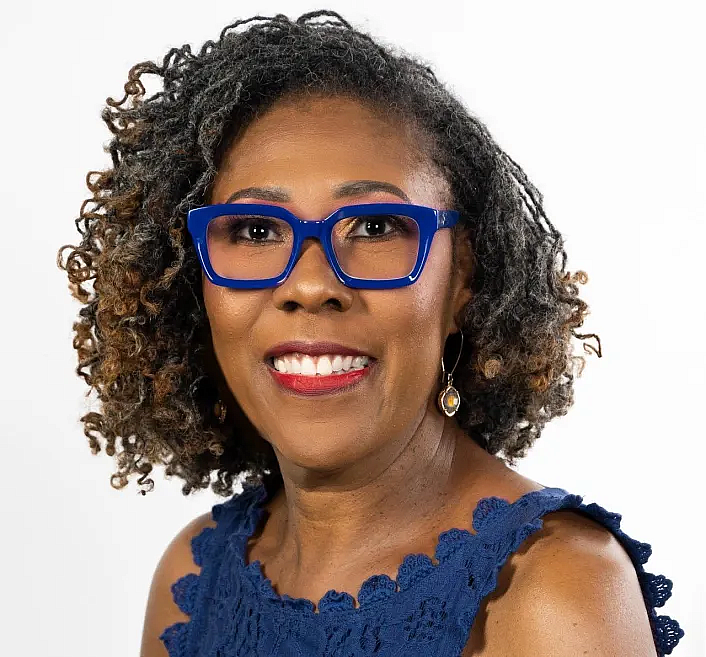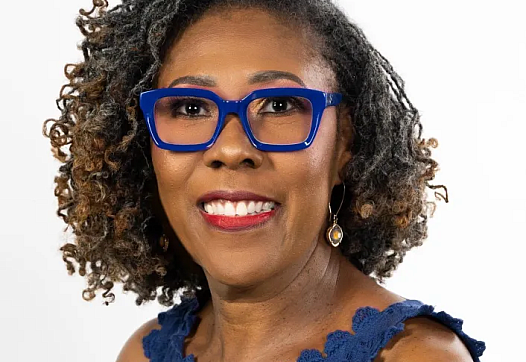Author, Therapist Tamala Floyd Is Healing Hand For Families Impacted By Child Welfare System
The story was originally published by the Observer with support from our 2025 Child Welfare Impact Reporting Fund.

Tamala Floyd
Photo Courtesy Elaine Fox of Fox Photography
Tamala Floyd’s path to becoming a therapist and life coach is guided by her personal experiences and professional dedication to helping others heal and transform their lives.
Today she’s based in Florida, but Floyd’s journey began as a child in Southern California, growing up in a home marked by domestic violence. Though not the direct target, she vividly recalls the impact of the conflict between her parents on her health and mental well-being.
“One of the things I’m connecting now as an adult is how much that impacted my nervous system,” she says.
This environment instilled in her a profound sense of responsibility, particularly as the oldest sibling. She felt compelled to protect her younger sister and brother from the turmoil, leading to a heightened sensitivity to emotional shifts and resulting in high anxiety. “I need to protect them and make sure that they don’t hear this or see this,” became her mantra.
This early experience shaped Floyd’s understanding of how trauma affects individuals and families. It also fostered a keen awareness of emotional dynamics.
“Becoming very keen on people’s emotional shifts has served me well as a psychotherapist,” she says.
Floyd’s initial academic pursuits led her to UCLA as a pre-law major. However, a psychology class sparked a profound shift in her direction.
“That changed everything,” she says.
The pivotal moment led her to transfer to Cal State Long Beach, where she majored in psychology and later pursued a master’s in social work from the University of Southern California. Her passion lay in understanding how a person’s environment influences their well-being.
“I love the person and environment structure of social work versus just looking at the individual,” she says. “I understood how much a person’s environment impacts who they are, not just our individual makeup. We’re also impacted by our neighborhood, our church or the schools we go to.”
Floyd’s early professional experiences further solidified her commitment to serving vulnerable populations. Working with children in the foster care system and families at risk of separation, she witnessed firsthand the challenges and traumas they faced.
Her first home visit to a poor white family with young children living in deplorable conditions made a lasting impression.
“I left that home, and I went and sat in my car, and I could still cry now to think about children living like that,” Floyd recalls.
The experience fueled a determination to ensure that “children live with dignity.”
Her career evolved as she transitioned from a caseworker to a therapist, working with children who had been removed from their homes. She provided therapy, reunification services, and support to both children and their parents. She observed the anger and emotional turmoil these children experienced, often misdiagnosed as oppositional defiance or learning disabilities.
“Righteous anger does not need medication. We need to work through the anger,” she says, advocating for validation and emotional processing over pills.
Listening to the children’s pain, Floyd’s tender heart had her wanting to “gobble them up and take them all home and be their mom,” but she knew that wasn’t realistic.
Adopting children would in fact become a reality when she decided to adopt as a single woman. Her first daughter was 4 years old when she was placed with her in 1996. Before that, the child had been in 13 homes. She later found out about physical and sexual abuse that occurred in the girl’s biological home and subsequent placements.
Floyd’s attempts to help her daughter were met with difficulties.
“I was loving my child the way that I knew how to love her, but not the way she needed to be loved.”
Floyd married and adopted two other children. Her oldest daughter ran away at 17 and never returned to live in the family home. She’s an adult now, Floyd says, successfully navigating mental health challenges and being a mom herself.
A deeper understanding of trauma led Floyd to understand the need for tailored approaches to healing. In her work, she emphasizes the transformative impact of the Internal Family Systems (IFS) model with clients. According to “Psychology Today,” IFS identifies and addresses multiple sub-personalities or families within each person’s mental systems. Floyd was the first Black IFS trainer and fought for diversity in the field.
She shares insights in her 2024 book, “Listening When Parts Speak: A Practical Guide to Healing with Internal Family Systems Therapy and Ancestor Wisdom.”
IFS is based on the assertion that individuals have “parts” that help them deal with their traumas. Floyd believes that “parts” have sustained Blacks in America and that the ancestors can help do “legacy burden work.”
“Some of the burdens passed down to my Black female clients in particular are self reliance; the need to be strong while denying vulnerability or emotions; striving and feeling guilty for resting; a scarcity perspective, believing that there’s not enough and if they stop pushing, they will miss out; caretaking (for) others and ignoring self care; sexualization of Black women and girls; colorism; racism; and of course, slavery, which is the origin of many of these legacy burdens,” she writes in the book.
In an upcoming audiobook, “Healing the Wounded Mother,” Floyd delves into the complexities of mother-child relationships and the impact of trauma on both. Many a woman, she says, has become a mother before resolving past traumas.
“Sometimes she doesn’t even know that her traumas are impacting her parenting.”
Floyd will narrate as she did with her first book.
“In the book, I talk about myself as a wounded mother. Nobody can tell your story like you can,” she says.


